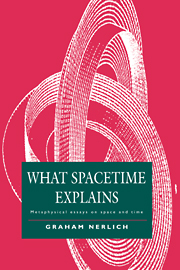Part Three - Time and causation
Published online by Cambridge University Press: 19 October 2009
Summary
The essays in this part are both about time just by itself and about cause and the relation between them. Time has long puzzled us. Leibniz is the progenitor of one form of an idea that time is an illusion, though founded objectively on what one might roughly call causal relations among monads. This idea has been ably and decisively criticised in Sklar (1974), chapter IV. I take that critique largely for granted here in rejecting the causal theory in general. I take it, as Sklar does, that the idea of cause is dependent on that of time.
Newton said, in the Scholium in Principia, that ‘absolute true and mathematical time … flows equably from past to future without regard to anything external’. It is the idea of flow which Newton evidently felt picked out the essential feature which makes time different from space. Plainly enough, flow is a metaphor for this deep-seated feature, whatever exactly it is. We need to ask what there is about time which gives the metaphor such dominance over us. Clearly it does refer to some deep structural feature for it is difficult indeed to think about time without the metaphors of flow or passage pervading our thoughts, however confused and confusing they are.
The metaphor of flow is tied somehow to the idea of the present as a reference point. But since there is no grip for a metaphorical flow of space, we take ourselves to refer to the present time in something other than the way we refer to the present place.
- Type
- Chapter
- Information
- What Spacetime ExplainsMetaphysical Essays on Space and Time, pp. 225 - 229Publisher: Cambridge University PressPrint publication year: 1994



